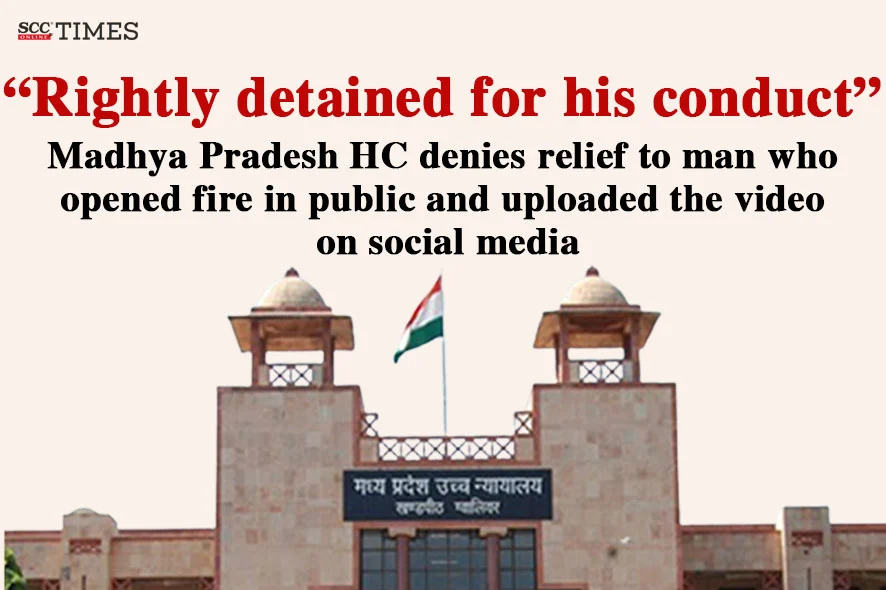Madhya Pradesh High Court: In a writ petition filed by a man who open fired in a residential area and uploaded a video of it challenging the detention order passed against him under Section 3(2) of the National Security Act, 1980 (‘NSA’), the Division Bench of Anand Pathak* and Pushpendra Yadav, JJ., dismissed the petition, holding that the accused was rightly detained for his conduct.
Background
The accused, a resident of village Dadumar, Bhitarwar, Gwalior, was detained under Section 25 and 27 of the Arms Act, 1959, for open firing in a residential area while filming himself and uploading the same on social media. Thereafter, the impugned order was passed against him, whereby his detention was increased by three months by the District Magistrate under Section 3 of the NSA.
When he was in Central Jail, Rewa, a further order was passed, thereby extending the period of detention for three more months. The accused submitted a representation for the cancellation of the aforesaid order, but to no avail.
Aggrieved, he filed the present petition.
Analysis
Upon perusal of the list of dates and events, the Court stated that it appeared that the authorities undertook all the proceedings within the statutory time frame.
Regarding the grounds of detention, the Court noted that 9 cases had been registered against the accused, out of which two were registered under Section 307 of the Penal Code, 1860, and seven cases were registered under the Arms Act.
The Court further noted that the video in question indicated that he opened fire in a residential area, challenging the police, and uploaded the video, thereby creating terror and fear amongst residents living in the vicinity. He was a threat to public order. Therefore, he was rightly detained under the NSA.
“Sometimes offences are grievous, and sometimes, the manner in which a person behaves (someone with criminal antecedents) also creates fear amongst people. Therefore, for maintaining public order, peace, and tranquillity in the region, this is a restraining step required in the attending set of facts.”
The Court further added that if it ventured into the nature of allegations, then it may go into the realm of subjectivity, as authorities always assess the situation before deciding to act.
The Court referred to Rameshwar Shaw v. District Magistrate, 1963 SCC OnLine SC 33, wherein the Supreme Court held that past conduct or antecedent/history of the person on which the authority purports to act, should ordinarily be proximate in point of time and should have a rational connection with the conclusion that the detention of the person is necessary. Referring to the aforesaid case, the Court stated that in the present case, the past conduct of the accused was already haunting him.
“The uploading of the video where he opened fire from his country-made pistol in the vicinity of public and sending a message of threat prompted the authority to act proactively.”
Thus, the Court held that after perusing the reply and documents filed by the authorities, it appeared that the accused was rightly detained for his conduct.
Accordingly, the petition was dismissed, holding that no interference could be made.
[Shivang Bhargav v. State of Madhya Pradesh, 2025 SCC OnLine MP 6580, decided on 04-09-2025]
*Order authored by: Justice Anand Pathak
Advocates who appeared in this case :
For the petitioner: Rohit Tiwari and Rajesh Kushwah
For the respondent: Government Advocate Sohit Mishra



